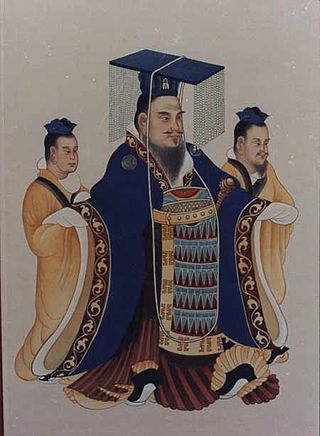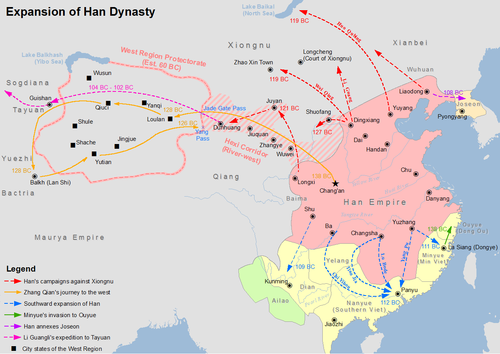
This article concerns the period 109 BC – 100 BC.
This article concerns the period 119 BC – 110 BC.
This article concerns the period 129 BC – 120 BC.
Year 123 BC was a year of the pre-Julian Roman calendar. At the time it was known as the Year of the Consulship of Balearicus and Flamininus and the Sixth Year of Yuanshuo. The denomination 123 BC for this year has been used since the early medieval period, when the Anno Domini calendar era became the prevalent method in Europe for naming years.
Year 119 BC was a year of the pre-Julian Roman calendar. At the time it was known as the Year of the Consulship of Dalmaticus and Cotta and the Fourth Year of Yuanshou. The denomination 119 BC for this year has been used since the early medieval period, when the Anno Domini calendar era became the prevalent method in Europe for naming years.
Year 121 BC was a year of the pre-Julian Roman calendar. At the time it was known as the Year of the Consulship of Opimius and Allobrogicus and the Second Year of Yuanshou. The denomination 121 BC for this year has been used since the early medieval period, when the Anno Domini calendar era became the prevalent method in Europe for naming years.

Emperor Wu of Han, born Liu Che and courtesy name Tong, was the seventh emperor of the Han dynasty from 141 to 87 BC. His reign lasted 54 years – a record not broken until the reign of the Kangxi Emperor more than 1,800 years later – and remains the record for ethnic Han emperors. His reign resulted in a vast expansion of geopolitical influence for the Chinese civilization, and the development of a strong centralized state via governmental policies, economical reorganization and promotion of a hybrid Legalist–Confucian doctrine. In the field of historical social and cultural studies, Emperor Wu is known for his religious innovations and patronage of the poetic and musical arts, including development of the Imperial Music Bureau into a prestigious entity. It was also during his reign that cultural contact with western Eurasia was greatly increased, directly and indirectly.
Heqin, also known as marriage alliance, refers to the historical practice of Chinese monarchs marrying princesses—usually members of minor branches of the ruling family—to rulers of neighboring states. It was often adopted as an appeasement strategy with an enemy state that was too powerful to defeat on the battlefield. The policy was not always effective. It implied an equal diplomatic status between the two monarchs. As a result, it was controversial and had many critics.
Wei Zifu, posthumously known as Empress Si of the Filial Wu or Wei Si Hou, was an empress consort during ancient China's Han dynasty. She was the second wife of the famous Emperor Wu and his spouse for 49 years. She stayed as his empress for 38 years, the second longest in Chinese history. She was the mother of Emperor Wu's heir apparent Liu Ju and a great-grandmother of Liu Bingyi, as well as an older half-sister of the famed general Wei Qing, a younger aunt of Huo Qubing, and a step-aunt of Han statesman Huo Guang.

Huo Qubing was a Chinese military general and politician of the Western Han dynasty during the reign of Emperor Wu of Han. He was a nephew of the general Wei Qing and Empress Wei Zifu, and a half-brother of the statesman Huo Guang. Along with Wei Qing, he led a campaign into the Gobi Desert of what is now Mongolia to defeat the Xiongnu nomadic confederation, winning decisive victories such as the Battle of Mobei in 119 BC. Huo Qubing was one of the most legendary commanders in Chinese history, and still lives on in Chinese culture today.
Wei Qing, courtesy name Zhongqing, born Zheng Qing in Linfen, Shanxi, was a Chinese military general and politician of the Western Han dynasty who was acclaimed for his campaigns against the Xiongnu, and his rags to riches life. He was a consort kin of Emperor Wu of Han as the younger half-brother of Emperor Wu's wife Empress Wei Zifu, and later the third husband of Emperor Wu's older sister Eldest Princess Yangxin. He was also the maternal uncle of Huo Qubing, another decorated Han general who participated in the war against the Xiongnu.
The Battle of Mayi, also known as the Scheme of Mayi (馬邑之謀) or the Encirclement at Mayi (馬邑之圍), was an abortive ambush operation by the Han dynasty against the invading Xiongnu forces led by Junchen Chanyu, with minimal casualties from both sides. Although no fighting actually took place, it marked the end of de jure peace between the Han dynasty and Xiongnu, and led to the beginning of the subsequent Han-Xiongnu War. The failure of the operation also motivated the Han court to develop effective cavalry forces and the use of offensive expeditionary military policies.
The Battle of Mobei was a military campaign fought mainly in modern-day Mongolia, in the extreme cold and barren lands of the Gobi Desert. It was part of a major strategic offensive launched by the Han dynasty in the winter of January 119 BC, into the heartland of the nomadic Xiongnu. The campaign was a success for the Han, whose forces led by Wei Qing and Huo Qubing reached as far north as Lake Baikal.

The Han–Xiongnu War, also known as the Sino–Xiongnu War, was a series of military conflicts fought over two centuries between the Chinese Han Empire and the nomadic Xiongnu confederation, although extended conflicts can be traced back as early as 200 BC and ahead as late as 188 AD.
Zhao Xin was a prominent Xiongnu general in the late 2nd century BCE during the Han–Xiongnu War. He defected first to the Han dynasty then back to the Xiongnu.

The Emperor in Han Dynasty, also released under the title The Emperor Han Wu in some countries, is a 2005 Chinese historical drama television series based on the life of Emperor Wu of the Han dynasty. It uses the historical texts Records of the Grand Historian and Book of Han as its source material.
Li Ling, courtesy name Shaoqing, was a Chinese military general of the Western Han dynasty who served during the reign of Emperor Wu. He later defected to the Xiongnu after being defeated in an expedition in 99 BC.

Yizhixie was the brother of Junchen Chanyu and his successor to the Xiongnu throne. Yizhixie ruled during a time of conflict with the southern Han dynasty under the military expansionist Emperor Wu of Han.
Gongsun Ao was a Chinese military commander and general during the Western Han dynasty of China. He was noted for participating in the imperial campaigns against the Xiongnu.

The military of the Han dynasty was the military apparatus of China from 202 BC to 220 AD, with a brief interregnum by the reign of Wang Mang and his Xin dynasty from 9 AD to 23 AD, followed by two years of civil war before the refounding of the Han.








